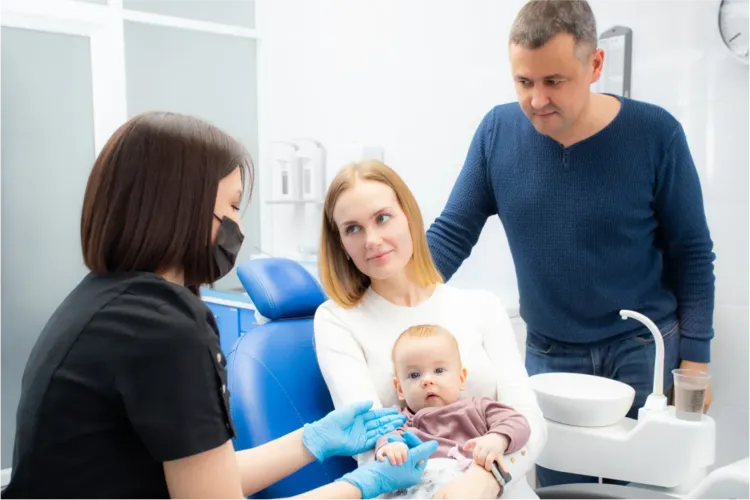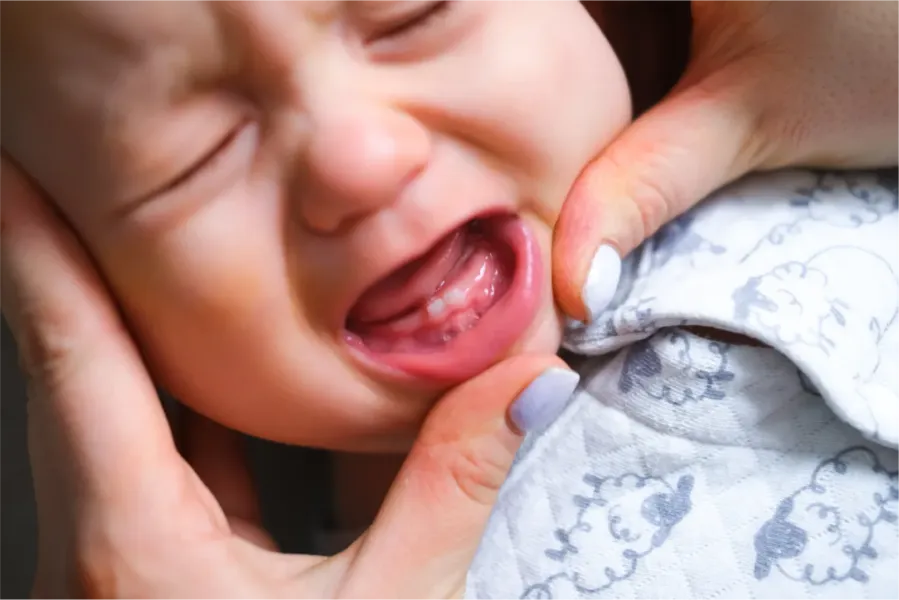Oral Care for Infants in Greeley, CO
It’s never too early to start early infant dental care.
- Build key habits early on to prevent decay
- Guard against cavity-causing bacteria
- Take action against preterm births

Can’t I wait until my baby has teeth?
In short—it’s better not to wait. Bacteria can grow in any mouth, regardless of the presence of teeth. And if the bacteria is already there, it can cause teeth to begin to decay as soon as they erupt from the gums, which causes other problems down the road.
That’s why we provide early infant oral care at Greeley Kids Pediatric Dentistry. We’ll provide the care needed so your baby can grow strong, healthy teeth and bright, happy smiles.
Stress-Free Parenting
(for their teeth, at least!)
It’s a lot to take care of a new baby! There are so many things to remember. Their teeth shouldn’t be another stressor for you. You deserve a team standing behind you to provide tips, tricks, and help when you need it so your baby’s smile is as healthy as it is bright!
A Team on Your Side
If you’re not sure if you should use fluoride (or even toothpaste!), how you should brush, or more, our team will walk you through best early infant oral practices.
Protect Them Early
You can practice good oral hygiene on your infant’s behalf, and we’ll protect against cavities and decay with protective coatings once teeth break through.
Start Feeling Comfortable
The earlier you find a dental home you feel safe and comfortable at, the more likely your child will be growing up not scared of the dentist.
“Greeley kids Dental is the most amazing Dentist office. The staff is very perfesional and caring. The dentist assistants are remarkable and take pride in their work. They spent their time cleaning my youngest son's teeth very gently, while walking my baby through everything so they were comfortable. The Dentist is absolutely over the top and definitely loves what she does. She took the time to explain everything that was going on with my boys. She answered any questions or concerns I had in a very professional manner. Definitely the best Dentistry I have ever seen! 10 ⭐️'s hands down!”
-Sara
Have Questions? We’ve Got Answers!
You’re not the only parent to wonder about best oral practices for babies. Below are questions we get asked a lot (and their answers).
Is there anything I need to do before my baby’s teeth erupt through the gums?
In short, yes! We recommend that you start cleaning your child's gums with a soft, clean cloth and water at birth. The easiest way to do this is to sit down, place the child’s head in your lap or lay the child on a dressing table or the floor. Whatever position you use, be sure you can see into the child’s mouth easily.
Additionally, mothers need to care for their own teeth well, too, as they can pass bacteria along to their children (see below for more).
Is there anything I need to do once my baby starts getting teeth?
As soon as your child's teeth break through the gums, brush the teeth with a soft-bristled toothbrush. If they are under the age of 2, use a small "smear" of toothpaste. (Be sure and use an ADA-accepted fluoride toothpaste and make sure your child does not swallow it.) Once they turn 2, you can use a "pea-size" amount of toothpaste. When brushing, the parent should brush the child's teeth until they are old enough to do a good job on their own.
Why does my child need to floss when they have so few teeth that don’t touch?
Flossing not only removes plaque from between teeth but also from under the gumline where a toothbrush can't reach. Flossing should begin when any two teeth touch. Be sure and floss your child's teeth daily until he or she can do it alone. You can find helpful flossers for children in most grocery stores.
Will a sippy cup damage my baby’s teeth?
Again, the answer is unfortunately yes. Sippy cups should be used as a training tool from the bottle to a cup and should be discontinued by the first birthday. If your child uses a sippy cup throughout the day, fill the sippy cup with water only (except at mealtimes). By filling the sippy cup with liquids that contain sugar (including milk, fruit juice, sports drinks, etc.) and allowing a child to drink from it throughout the day, the child’s teeth get regularly soaked in but not cleaned from cavity-causing bacteria.
Will a bottle damage my baby’s teeth?
In short, yes, if not used correctly. Bottle tooth decay is a common and serious form of decay in young children. The decay is caused by frequent and long exposures of an infant’s teeth to liquids that contain sugar. Among these liquids are milk (including breast milk), formula, fruit juice and other sweetened drinks.
In order to protect against bottle tooth decay, wipe the baby’s gums and teeth with a damp washcloth or gauze pad to remove plaque after each feeding.
Additionally, putting a baby to bed for a nap or at night with a bottle other than water can cause serious and rapid tooth decay. Sweet liquid pools around the child’s teeth giving plaque bacteria an opportunity to produce acids that attack tooth enamel. If you must give the baby a bottle as a comforter at bedtime, it should contain only water. If your child won't fall asleep without the bottle, gradually dilute the bottle's contents with water over a period of two to three weeks.
When should I first bring my baby to the dentist?
The American Academy of Pediatrics (AAP), the American Dental Association (ADA), and the American Academy of Pediatric Dentistry (AAPD) all recommend establishing a "Dental Home" for your child by one year of age. Children who have a dental home are more likely to receive appropriate preventive and routine oral health care.
You can make the first visit to the dentist enjoyable and positive. If old enough, your child should be informed of the visit and told that the dentist and their staff will explain all procedures and answer any questions. The less to-do concerning the visit, the better.
It is best if you refrain from using words around your child that might cause unnecessary fear, such as needle, pull, drill or hurt. Pediatric dental offices make a practice of using words that convey the same message, but are pleasant and non-frightening to the child.
Mom’s Smile Matters, Too!
According to recommendations made by the American Academy of Pediatric Dentistry (AAPD), all pregnant women receive oral healthcare during pregnancy. Research has shown evidence that periodontal disease in pregnant mothers can increase the risk of preterm birth and low birth weight. If you are expecting, talk to your doctor or dentist about ways you can prevent periodontal disease during pregnancy.
Furthermore, pregnant women who neglect oral health care may be at a greater risk of passing the bacteria along, which can lead to cavities in their young children.
Mothers should follow these simple steps to decrease the risk of spreading cavity-causing bacteria:
- Brush and floss on a daily basis to reduce bacterial plaque.
- Visit your dentist regularly.
- Reduce beverages and foods that are high in sugar & starch.
- Use a toothpaste with fluoride recommended by the ADA and rinse every night with an alcohol-free, over-the-counter mouth rinse with .05 % sodium fluoride in order to reduce plaque levels.
- Don't share utensils, cups or food. This can cause the transmission of cavity-causing bacteria to your children.
- Use of xylitol chewing gum (4 pieces per day by the mother) can decrease a child’s caries rate

“They were spectacular with my 19 mo old both today and several months back when he had a freak mouth issue. We are very happy.”
-Alicia

